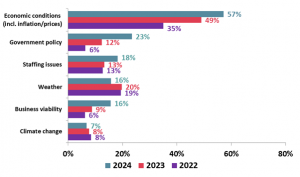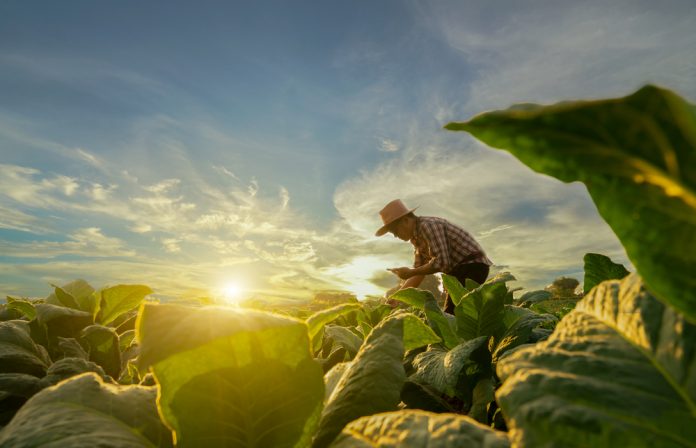A special Roy Morgan survey of Australian farmers shows a majority of farmers (57%) say the biggest challenge they are facing is economic conditions (including inflation/prices), up 8% points from a year ago and up a large 22% points from 2022.
In a clear second place is Government policy mentioned by 23% of farmers, almost doubling from a year ago (up 11% points from 2023) and up by 17% points from 2022. Over the last two years Government policy has increased from equal fifth to a clear second place in the list of challenges.
Staffing issues, including finding sufficient labour for their farms, are the third most prominent issue and mentioned by 18% of farmers as the biggest challenge they face, up 5% points from a year ago.
Filling out the top five issues were weather, mentioned by 16% of farmers, business viability, also at 16% and somewhat surprisingly, climate change, mentioned by only 7% of farmers and down from a year ago.
The results in the special Roy Morgan Farmer AgTech Survey are based on 1001 in-depth interviews with Australian farmers conducted during April and May 2024.
View the Roy Morgan Farmer AgTech Survey 2024 Webinar here. (11 mins).
For data and results on AgTech see this finding: AgTech is used by a majority of Australian farmers
Top six challenges for Australian farmers led by economic conditions (incl. inflation/prices)

Source: Roy Morgan Farmers AgTech Survey April-May 2024. Roy Morgan Farmer Agribusiness Brand Trust Research 2022 and 2023. Base: Australian farmers 18+. 2024 n=1,001, 2023 n=1,002, 2022 n=1,230.
Farmers were asked in their own words to describe the biggest challenges they face
“Unstable prices at the sale gate. Hard to plan when there’s no stability in the value of our end product.” (Beef farmer, Queensland).
“Stagnating commodity prices. Ever higher input costs. Inability to find labour. Land price that is prohibiting expansion as returns on investment are not high enough.” (Sheep and broadacre farmer, NSW).
“Price takers. Weather and world economic issues – all of which we are unable to control. Currently the price of what we grow is shameful.” (Beef farmer, WA).
“Sheep being worth nothing and feed and fertiliser costs being high. With a government who wants to shut your markets down making everything numerically worse.” (Sheep farmer, WA).
Australian farmers are worried about their prospects over the next year
A majority of Australian farmers (60%) expect their farming business will be ‘financially better off’ next year compared to 40% who expect to be ‘worse off’. However, Queensland farmers are far more pessimistic about the future with 66% expecting their business will be ‘worse off financially’ this time next year.
Looking forward, Australian farmers are far more optimistic about the future compared to how they feel about a year ago. Over two-thirds of farmers (70%) say their farming business is ‘worse off financially’ than a year ago compared to only 30% who say they are ‘better off’.
Of concern, a majority of 58% of farmers say the next 12 months is a ‘bad time to invest in growing the business’. An even larger majority of 66% of farmers with an annual revenue of less than $100,000 say it is a ‘bad time to invest’.
In terms of the Australian economy a clear majority of 69% of farmers expect the economy to experience ‘bad times’ over both the next 12 months and the longer-term over the next five years. West Australian farmers are the most negative with 87% saying the economy will experience ‘bad times’ over the next year.
Roy Morgan CEO Michele Levine says Australian farmers are concerned about the year ahead with 57% mentioning ‘economic conditions’ as their biggest challenge and 58% who say the next 12 months is a ‘bad time to invest in growing the business’.
“Roy Morgan’s special Farmer Agricultural Technology Survey (view webinar on survey results) explored not only farmers’ views on ‘AgTech’ but also their broader views on the challenges they face and how they regard their own prospects going forward,” Ms Levine said.
“The results should be a concern for those involved with the Australian agricultural industry as Australian farmers are worried about the year ahead on several fronts.”
“First and foremost, Australian farmers are concerned about economic challenges, including inflation and prices, which are regarded by 57% of farmers as the biggest challenge they face – up sharply by 22% points from two years ago and well ahead of any other issue,” she said.
“In addition, nearly a quarter of farmers, 23%, have the Government in their sights, and cite Government policy as the biggest challenge they face. This is up a stunning 17% points from 2022 when the Albanese Government was newly elected.”
“Although the issues of economics and Government policy have notably increased over the last two years, the related challenges of the weather and climate change have markedly decreased,” Ms Levine said.
“Only 16% of farmers consider the weather their biggest challenge (down 4% points from a year ago) and just 7% name climate change as the top challenge (down 1% point). The weather was regarded as the second biggest challenge in both 2022 and 2023 and now ranks equal fourth.”
“Farmers are also fairly gloomy on the broader economic environment with over two-thirds of farmers (69%) expecting ‘bad times’ for the economy over the next year and next five years and a majority of 58% saying now is a ‘bad time to invest in growing the business’,” she said.
“The one bright light is that farmers remain positive about their own prospects with a majority of 60% expecting their own farming business will be ‘better off financially’ this time next year compared to only 40% that expect to be ‘worse off’.”
“Although this survey was completed before this week’s legislation to phase out live sheep exports by May 2026, there were already serious concerns raised by farmers – especially in WA about the prospect of the ban – ‘Sheep being worth nothing and feed and fertiliser costs being high. With a government who wants to shut your markets down making everything numerically worse.’ (Sheep farmer, WA)’ – a widely-held view out west,” Ms Levine said.




